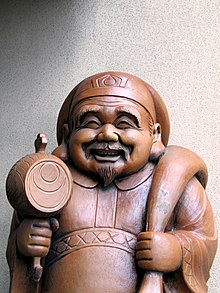Daikoku

Daikoku ( Japanese 大 黒 , also: Daikokuten ( 大 黒 天 )) is one of the Seven Gods of Luck ( Shichi Fukujin ) in Japan .
Attributes
Like most gods of luck, Daikoku is a stout, always laughing man with thick earlobes. He wears traditional Japanese clothes and a red cap. In his right hand he holds a lucky hammer and in his left a sack with riches. Mostly he stands or sits on two rice sacks. These sacks are often decorated with the Buddhist wish jewel. His animal companion is the rat , which is often shown near him in pictures of Daikoku.
Symbolism and origin
Daikoku is the Japanese god of wealth, especially of abundant harvest, food and cuisine. This is u. a. recognizable by his rice sacks. His hammer is a magical tool that appears again and again in Japanese legends, with which one can fulfill wishes. His thick earlobes are actually one of the 32 characteristics of a Buddha , which suggests his Buddhist origins. Daikoku literally means Great Black , a name that it took over from its Indian precursor Mahakala ( also Great Black in Sanskrit ). Mahakala is considered a punitive form of Shiva in Hinduism , but is also venerated in Buddhism - today especially in Tibet . He is a terrifying figure with black skin, three faces and predatory teeth. Daikoku / Mahakala came to Japan in this form with Buddhism. Early images of Japanese Daikoku actually show him with three faces and / or black skin, but since he was considered the god of wealth (around the 16th century), he has lost his terrifying features.
Representation and cult
Daikoku is often portrayed together with the other six gods of luck, or as a couple with Ebisu , the god of fishermen. Ebisu is sometimes said to be Daikoku's son. Both are particularly popular motifs of the netsuke and ukiyoe artists. In today's Japan, Daikoku is mostly worshiped in Shinto shrines , but also in some Buddhist temples. In the religious customs of Japan, it is given special attention, especially at the New Year.
See also
Web links
- Iwai Hiroshi: "Daikokuten" . In: Encyclopedia of Shinto. Kokugaku-in , March 13, 2005 (English)
- Bernhard Scheid: Metamorphoses of Daikoku
